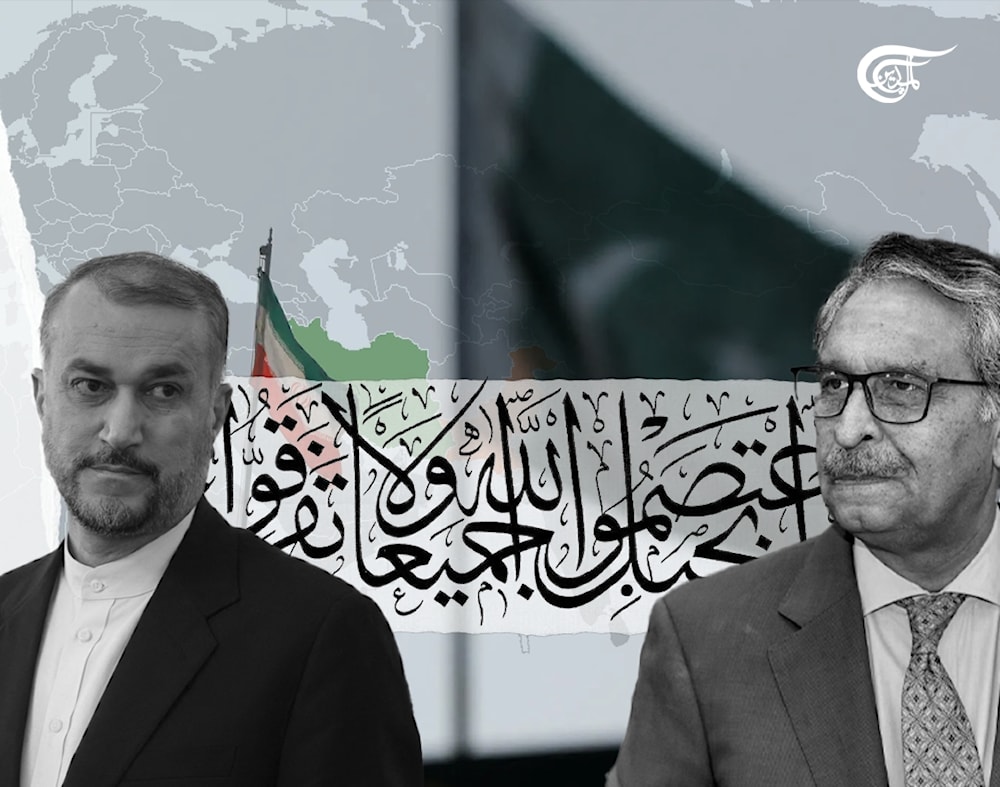Pakistan-Iran: Bridging gaps or coming destabilization?
Iran and Pakistan share more than 900 km of border, and from a geopolitical standpoint, it is imperative that both maintain collaboration and coordination.
-

The voices that mobilize this essentialist discourse, claiming that Iran and Pakistan are destined for confrontation due to their sectarian configuration, aim to create that scenario of division. (Al Mayadeen English; Illustrated by Arwa Makki)
On January 17, Iran's Islamic Revolution Guard Corps attacked two bases of the Jaish al-Adl group, considered terrorist by Iranian authorities. In response, on January 18, the Pakistani army conducted what it described as "highly coordinated" military strikes against "hideouts of armed groups in the Sistan-Baluchestan province of Iran."
From the Iranian perspective, the action against Jaish al-Adl was framed in the need to secure its border with Pakistan and eliminate a group that has carried out repeated attacks against members of the security forces, judiciary personnel, and members of the IRGC.
The group, created in 2012 after the dismantling of another terrorist group called Jundallah, claimed responsibility for an attack on a police station in the province bordering Pakistan in December 2023, resulting in the martyrdom of 11 police officers. Moreover, according to Iranian intelligence sources, the group receives financial and military support from the Israeli regime.
Due to the attacks on both sides of the border, there have been speculations pointing to a lack of coordination between the two countries. Similarly, these attacks have been used to accuse the Islamic Republic of making a geopolitical mistake. From Iran's perspective, on the other hand, the operation against Jaish al-Adl is understood as a reasonable response in geopolitical terms, due to the urgent need to secure its border with Pakistan and, in particular, to dismantle the takfiri group. Takfirism is the term within the Islamic political tradition for groups that, based on their exclusivist and rigorous vision, excommunicate other Muslims, considering them apostates, and justify violence against them.
Regarding the rationality of the Islamic Republic, it is important to remember that, as reported by the state news agency IRNA, in the days leading up to the incident, the de facto ambassador of Iran to Afghanistan, Hassan Kazemi Ghomi, visited Islamabad to meet with Pakistani political leaders. This was interpreted as a potential opportunity for coordination.
The emergence of voices in Pakistan accusing Iran of "maintaining an expansionist attitude" and opposing "Pakistani stability against Iranian adventurism" cannot be overlooked either. Such statements are part of a discursive framework that reveals a colonial vision deeply rooted in the Westernized elite of Pakistan. This elite believes that any attempt to promote Islamization, understood in terms of defending the independence and autonomy of society and the country, goes against their personal and political interests. An understanding with Iran poses a discursive challenge to the secularized Pakistani elite.
Another notable reaction on the Pakistani side has been the discursive mobilization of essentialist reductionism that pits Sunnis against Shias, as observed on Platform X (formerly Twitter).
This excessive simplification is responsible, for example, for explaining the conflict between Iran and Iraq in the 1980s through an essentialist view that interprets Saddam Hussein's invasion of Iran as just another episode in the battles between Arabs and Persians for at least a thousand years.
In other words, these supposed essentialist explanations only aim to create internal division within the grammar of Islam, seeking to make the construction of a seamless Muslim identity impossible without sectarian fissures.
Furthermore, for the Islamic Republic, one of its fundamental characteristics inherited from Khomeini's political vision is what Islamic experts call a "post-mazhabi vision" – where mazhab, or madhhab, means a legal school in Arabic. In other words, even though Khomeini considered himself a member of the Jafari school, the main legal school of Shia Islam, his political practice is viewed as an attempt to bridge the gap between Sunni and Shia.
This pursuit of Islamic unity, with the ultimate goal of articulating an autonomous political identity, is jeopardized every time the essentialist discourse of Shia vs Sunni is mobilized.
This discourse, moreover, does not take into account the political dimensions. In other words, the war between Iran and Iraq has a political explanation: Saddam Hussein's invasion of Iranian territory just after the Islamic Revolution was executed in hopes that the new government would not be sufficiently consolidated or prepared to resist the invasion.
The voices that mobilize this essentialist discourse, claiming that Iran and Pakistan are destined for confrontation due to their sectarian configuration, aim to create that scenario of division. Faced with this simplistic reductionism, it is necessary to emphasize once again the idea of Islam as a discourse, with a divine origin, serving to express agreements and disagreements within the entire Muslim community. A community that politically encompasses all Muslims.
Iran and Pakistan share more than 900 km of border, and from a geopolitical standpoint, it is imperative that both maintain collaboration and coordination. Any other type of relationship between them not only does not benefit the region, but adds more instability to it.

 Xavier Villar
Xavier Villar
 5 Min Read
5 Min Read








